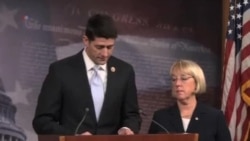CAPITOL HILL —
The U.S. House of Representatives is set to vote Thursday on a bipartisan budget agreement which would fund the federal government for the next two years. Analysts say the deal would avert the threat of budget showdowns and potential government shutdowns. But it fails to address the fundamental, long-term issue of spending priorities that has divided Congress for the past two years.
Before the holiday recess, House members have some unfinished business to tend to. And that's to vote on the budget, as current spending authority expires on January 15.
Senate Budget Committee Chairwoman Patty Murray, a Democrat, and House Budget Committee Chairman Paul Ryan, a Republican, announced the agreement. If passed, it would fund operations at about $1 trillion a year for the next two years. Ryan praised the deal.
"By having a budget agreement that does not raise taxes, that does reduce the deficit, and produces some certainty and prevents government shutdowns - we think is a good agreement," said Ryan.
Ryan said he is optimistic that the bill will pass in the House of Representatives, and President Barack Obama welcomed the measure, which is also likely to pass in the Democratic-controlled Senate.
But some conservative groups have attacked the deal because it will not cut spending as much as they want. This provoked a strong reaction from House Speaker John Boehner.
“This is ridiculous. Listen, if you’re for more deficit reduction, you’re for this agreement," said Boehner.
Democrats say they are disappointed because the deal fails to extend unemployment benefits for the long-term jobless. House Minority Leader Nancy Pelosi:
“It is absolutely unconscionable that we would possibly even consider leaving Washington, DC without passing those benefits," said Pelosi.
Budget analyst Stan Collender says a modest agreement is the best Americans could hope for.
“Congress would have trouble agreeing on what to order for lunch these days, so the idea that they are going to come up with an agreement on big priorities, defense versus non-defense, taxes versus spending, is extremely unlikely given the incredibly difficult, highly, hyper-partisan politics that exist in the United States today," said Collender.
With lawmakers eager to leave town, other issues like immigration reform will have to wait until next year.
Before the holiday recess, House members have some unfinished business to tend to. And that's to vote on the budget, as current spending authority expires on January 15.
Senate Budget Committee Chairwoman Patty Murray, a Democrat, and House Budget Committee Chairman Paul Ryan, a Republican, announced the agreement. If passed, it would fund operations at about $1 trillion a year for the next two years. Ryan praised the deal.
"By having a budget agreement that does not raise taxes, that does reduce the deficit, and produces some certainty and prevents government shutdowns - we think is a good agreement," said Ryan.
Ryan said he is optimistic that the bill will pass in the House of Representatives, and President Barack Obama welcomed the measure, which is also likely to pass in the Democratic-controlled Senate.
But some conservative groups have attacked the deal because it will not cut spending as much as they want. This provoked a strong reaction from House Speaker John Boehner.
“This is ridiculous. Listen, if you’re for more deficit reduction, you’re for this agreement," said Boehner.
Democrats say they are disappointed because the deal fails to extend unemployment benefits for the long-term jobless. House Minority Leader Nancy Pelosi:
“It is absolutely unconscionable that we would possibly even consider leaving Washington, DC without passing those benefits," said Pelosi.
Budget analyst Stan Collender says a modest agreement is the best Americans could hope for.
“Congress would have trouble agreeing on what to order for lunch these days, so the idea that they are going to come up with an agreement on big priorities, defense versus non-defense, taxes versus spending, is extremely unlikely given the incredibly difficult, highly, hyper-partisan politics that exist in the United States today," said Collender.
With lawmakers eager to leave town, other issues like immigration reform will have to wait until next year.





